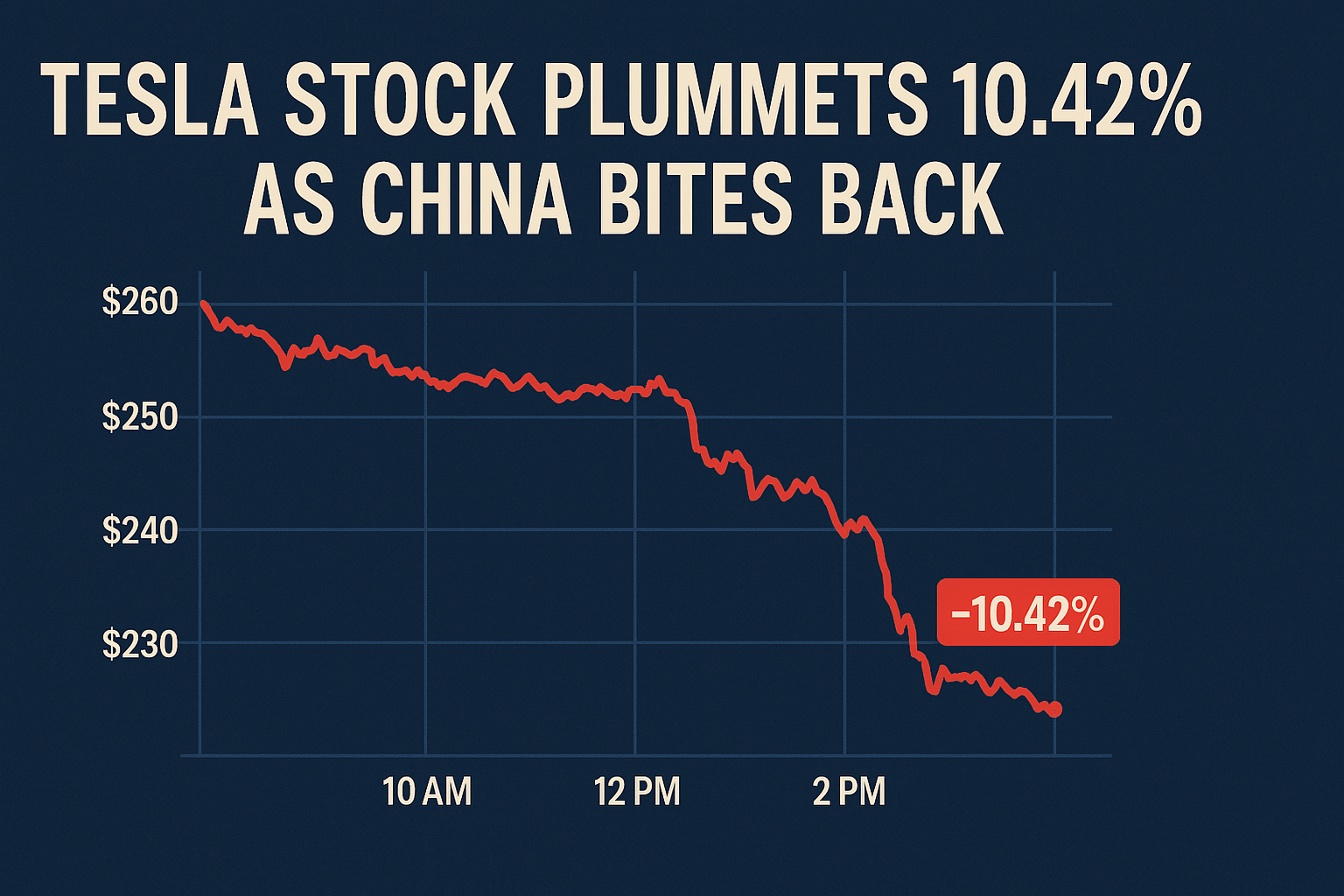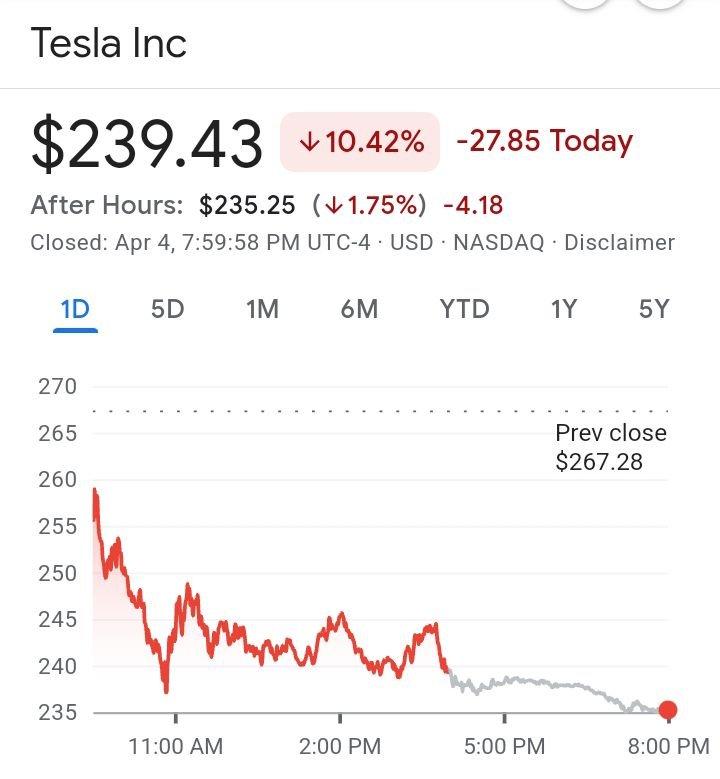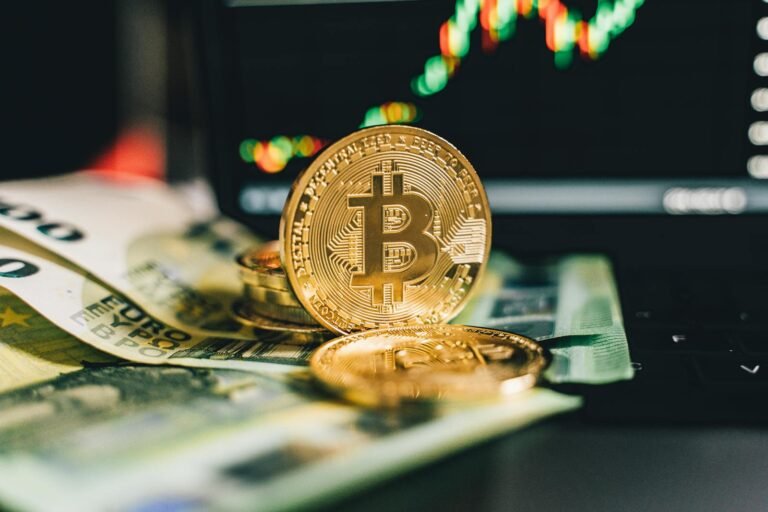
Tesla stock crashes. It’s s in freefall, crashing 10.42% and closing at $239.43 today. That’s a gut-punch drop of $27.85 in just one trading day. The after-hours numbers didn’t offer any comfort either—Tesla slipped another 1.75%, hitting $235.25 before the market even had a chance to breathe.
This wasn’t a solo crash. Apple and NVIDIA also took hits, but Tesla’s tumble was steeper and more brutal. The reason? A boiling pot of trade war politics, economic retaliation, and the unpredictable circus surrounding Elon Musk.

Trump’s Tariffs Light the Fuse: Tesla Stock Crashes
The Protectionist Pushback.
It all started on April 2, when President Donald Trump dropped a political grenade: sweeping reciprocal tariffs targeting major trade partners. Trump slapped China with 34% import tax.
Vehicles and parts not made in the U.S. now face a steep 25% duty. The message? Build here or pay the price.
China—Tesla’s second-largest market—clapped back hard. Tariffs on American imports followed almost instantly, and Tesla landed squarely in the crosshairs. The Shanghai Gigafactory, once a global jewel in Tesla’s crown, now looks like a costly liability.
ALSO READ:
CRYPTO CRASH: How Trump Tariffs Obliterated $487M in 24 Hours
Tesla Saw It Coming
This wasn’t out of left field. Back in March, Tesla had already warned the U.S. Trade Representative that this exact scenario was a disaster in the making. In a letter, the company called out the risk of retaliation and highlighted how crucial imported components—especially Chinese-made batteries—are to their supply chain.
Now the writing’s on the wall, and the market is responding exactly how you’d expect: sheer panic.
China Strikes Back: Tesla in the Crosshairs
National Security Smokescreens?
Online speculation is swirling. Posts on X suggest China may be ready to go nuclear—not literally, but economically—by shutting down Tesla’s Shanghai factory under the guise of national security. The theory? Musk’s recent appearance at CIA headquarters may have pushed Beijing over the edge.
If the Chinese government pulls that trigger, Tesla could lose over half of its global sales overnight. Even if they don’t, the retaliatory tariffs alone are already slashing into margins and inflaming competitive pressure from domestic brands like BYD and NIO.
Market Share Meltdown
Tesla’s slipping grip on the Chinese market isn’t new. BMW’s 13.4% sales decline last year shows how brutal local competition has become. Tesla is dancing on the same razor’s edge, and now the cost of doing business in China just got a lot higher.
With tariffs raising prices, and nationalist sentiment rising, Chinese consumers may decide Tesla’s just not worth it anymore. The company’s once-solid advantage is eroding—and fast.
The Musk-Trump Alliance: A Double-Edged Sword
When Politics Collide with Profit.
Elon Musk isn’t just a CEO. He’s also the newly minted head of the Department of Government Efficiency (DOGE), thanks to his bromance with Donald Trump. His mission? Cut costs, kill red tape, and streamline federal spending.
Sounds great on paper. But Musk’s deep dive into politics is raising eyebrows, especially abroad. In places like China and Germany, where anti-Trump sentiment is high, his association with the administration is becoming a branding liability.
Brand Damage at Home and Abroad
From Berlin to Boston, Musk’s words and tweets are costing Tesla real money. In Germany, his support for far-right parties like AfD is turning off potential buyers. In the U.K., 59% of car buyers say Musk is a reason they’d avoid Tesla altogether.
Even in the U.S., Democrats—typically more enthusiastic EV buyers—are cooling on the brand. Tesla’s falling stock price isn’t just about trade war fears. It’s also about Musk’s increasingly controversial public persona.
DOGE Drama: A Costly Distraction
Investors Are Losing Patience.
Musk’s role in DOGE may sound like satire, but it’s very real—and it’s very distracting. While he’s off slashing federal budgets and picking political fights, Tesla is dealing with real-world issues like factory shutdowns and plummeting deliveries.
According to Carscoops, Model Y production is already down, and Q1 saw a significant delivery slump. Analysts from Piper Sandler are warning that the company’s supply chain headaches are worsening. Musk’s attention, they argue, should be on Tesla—not Washington.
Public Backlash Is Heating Up.
The backlash isn’t just online. Senator Mark Kelly ditched his Tesla in protest, and some owners are slapping anti-Musk bumper stickers on their once-beloved EVs. X users like @TristanSnell are openly calling out Musk’s misplaced priorities, accusing him of running Tesla like a weekend side hustle.
A Broader Meltdown Beyond Tesla
Market Mayhem
Tesla’s plunge is part of a bigger mess. The Dow dropped 600 points on March 6, and the S&P 500 slid into correction territory. Tech stocks across the board are reeling. Apple and NVIDIA felt the burn. But Tesla? Tesla’s pain is deeper, and more personal.
High dependency on China, sky-high valuation, and Elon Musk’s talent for chaos are amplifying Tesla’s decline.
The Auto Industry Is Hurting
BMW’s profits dropped 37% last year. Nissan is pausing SUV production in Mexico. Ford and GM aren’t escaping unscathed either. Tesla, despite sourcing many parts from the U.S. and Canada, is still being rocked by costs of imported batteries and electronics.
Even Musk admits the price tag of Trump’s trade policy is steep. On March 27, he told investors the cost impact was “significant.” That’s putting it mildly.
What Lies Ahead for Tesla?
Can They Recover?
Tesla still has cards to play. Shifting more production to the U.S. or Europe could help reduce dependence on China. But with supply chain issues already causing delays, that’s easier said than done.
Doubling down on domestic sales might work—especially if Trump sweetens the pot with new EV incentives. But with Musk alienating a good chunk of the U.S. population, that could be a gamble too risky to take.
China Is Still the Wildcard
The biggest unknown is China. If regulators go beyond tariffs—launching antitrust probes or revoking Tesla’s license to operate—the consequences could be dire. On the flip side, if U.S. tariffs start to squeeze foreign EV makers more than Tesla, the company might regain its edge.
But for now, the market is nervous, and rightly so.





